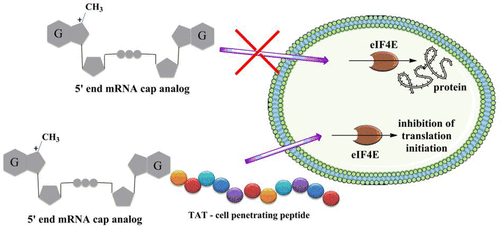当前位置:
X-MOL 学术
›
Bioconjugate Chem.
›
论文详情
Our official English website, www.x-mol.net, welcomes your feedback! (Note: you will need to create a separate account there.)
Effect of HIV-1 TAT Peptide Fusion on 5' mRNA Cap Analogs Cell Membrane Permeability and Translation Inhibition.
Bioconjugate Chemistry ( IF 4.7 ) Pub Date : 2020-03-31 , DOI: 10.1021/acs.bioconjchem.0c00080 Karolina Piecyk 1 , Paulina Pietrow 1 , Thomas Arnold 2 , Remigiusz Worch 3 , Nadejda L Korneeva 2, 4 , Marzena Jankowska-Anyszka 1
Bioconjugate Chemistry ( IF 4.7 ) Pub Date : 2020-03-31 , DOI: 10.1021/acs.bioconjchem.0c00080 Karolina Piecyk 1 , Paulina Pietrow 1 , Thomas Arnold 2 , Remigiusz Worch 3 , Nadejda L Korneeva 2, 4 , Marzena Jankowska-Anyszka 1
Affiliation

|
The development of targeted anticancer drugs has been one of the most challenging goals of current research. Eukaryotic translation initiation factor 4E (eIF4E) is an oncogene that stimulates mRNA translation via binding to the 5′ endcap structure. It is well documented that eIF4E is overexpressed in many cancers including breast, prostate, head and neck, and stomach malignancies and leads to oncogenic transformation and metastasis. One approach to block eIF4E function in cancer cells is based on the disruption of the interaction between eIF4E and the 5′ mRNA cap structure using cap analog inhibitors. Since analogs are cell-impermeable due to their anionic nature, we used a cell penetrating peptide (CPP) for delivery of model cap analogs into cancer cells. The human immunodeficiency virus I (HIV-1) transactivator of transcription derived peptide (TAT) was conjugated with the analogs m7GMP and m7GpppG using click chemistry methodology. We observed that both conjugates (m7GMP-TAT and m7GpppG-TAT), contrary to TAT alone, did not translocate through the artificial phospholipid membrane of giant unilamellar vesicles. This suggests that passive transport is not the mechanism by which translocation of cap analogs occurs. In contrast, synthesized fluorescently labeled m7GpppG-TAT translocated into the human breast adenocarcinoma cancer cell line MCF-7. Furthermore, we demonstrated that m7GMP-TAT and m7GpppG-TAT inhibited cap-dependent translation up to 30% both in vivo and in vitro while simultaneously not affecting cell growth and viability. These results demonstrate the usefulness of cell penetration peptides as carriers for the internalization of cap analogs.
中文翻译:

HIV-1 TAT肽融合物对5'mRNA Cap类似物细胞膜通透性和翻译抑制的影响。
靶向抗癌药的开发一直是当前研究中最具挑战性的目标之一。真核翻译起始因子4E(eIF4E)是一种癌基因,可通过与5'端帽结构结合来刺激mRNA翻译。众所周知,eIF4E在许多癌症中都过表达,包括乳腺癌,前列腺癌,头颈癌和胃癌,并导致致癌性转化和转移。一种在癌细胞中阻断eIF4E功能的方法是基于使用帽类似物抑制剂破坏eIF4E和5'mRNA帽结构之间的相互作用。由于类似物由于其阴离子性质而不能渗透细胞,因此我们使用细胞穿透肽(CPP)将模型帽类似物递送到癌细胞中。使用点击化学方法,获得7 GMP和m 7 GpppG。我们观察到,两个缀合物(m 7 GMP-TAT和m 7 GpppG-TAT)与单独的TAT相反,没有通过巨大的单层囊泡的人工磷脂膜移位。这表明被动转运不是发生帽类似物易位的机制。相反,合成的荧光标记的m 7 GpppG-TAT易位到人乳腺癌细胞系MCF-7中。此外,我们证明了在体内和体外,m 7 GMP-TAT和m 7 GpppG-TAT抑制了30%的帽依赖性翻译同时不影响细胞生长和活力。这些结果证明了细胞渗透肽作为载体用于帽类似物的内在化的有用性。
更新日期:2020-04-23
中文翻译:

HIV-1 TAT肽融合物对5'mRNA Cap类似物细胞膜通透性和翻译抑制的影响。
靶向抗癌药的开发一直是当前研究中最具挑战性的目标之一。真核翻译起始因子4E(eIF4E)是一种癌基因,可通过与5'端帽结构结合来刺激mRNA翻译。众所周知,eIF4E在许多癌症中都过表达,包括乳腺癌,前列腺癌,头颈癌和胃癌,并导致致癌性转化和转移。一种在癌细胞中阻断eIF4E功能的方法是基于使用帽类似物抑制剂破坏eIF4E和5'mRNA帽结构之间的相互作用。由于类似物由于其阴离子性质而不能渗透细胞,因此我们使用细胞穿透肽(CPP)将模型帽类似物递送到癌细胞中。使用点击化学方法,获得7 GMP和m 7 GpppG。我们观察到,两个缀合物(m 7 GMP-TAT和m 7 GpppG-TAT)与单独的TAT相反,没有通过巨大的单层囊泡的人工磷脂膜移位。这表明被动转运不是发生帽类似物易位的机制。相反,合成的荧光标记的m 7 GpppG-TAT易位到人乳腺癌细胞系MCF-7中。此外,我们证明了在体内和体外,m 7 GMP-TAT和m 7 GpppG-TAT抑制了30%的帽依赖性翻译同时不影响细胞生长和活力。这些结果证明了细胞渗透肽作为载体用于帽类似物的内在化的有用性。


























 京公网安备 11010802027423号
京公网安备 11010802027423号